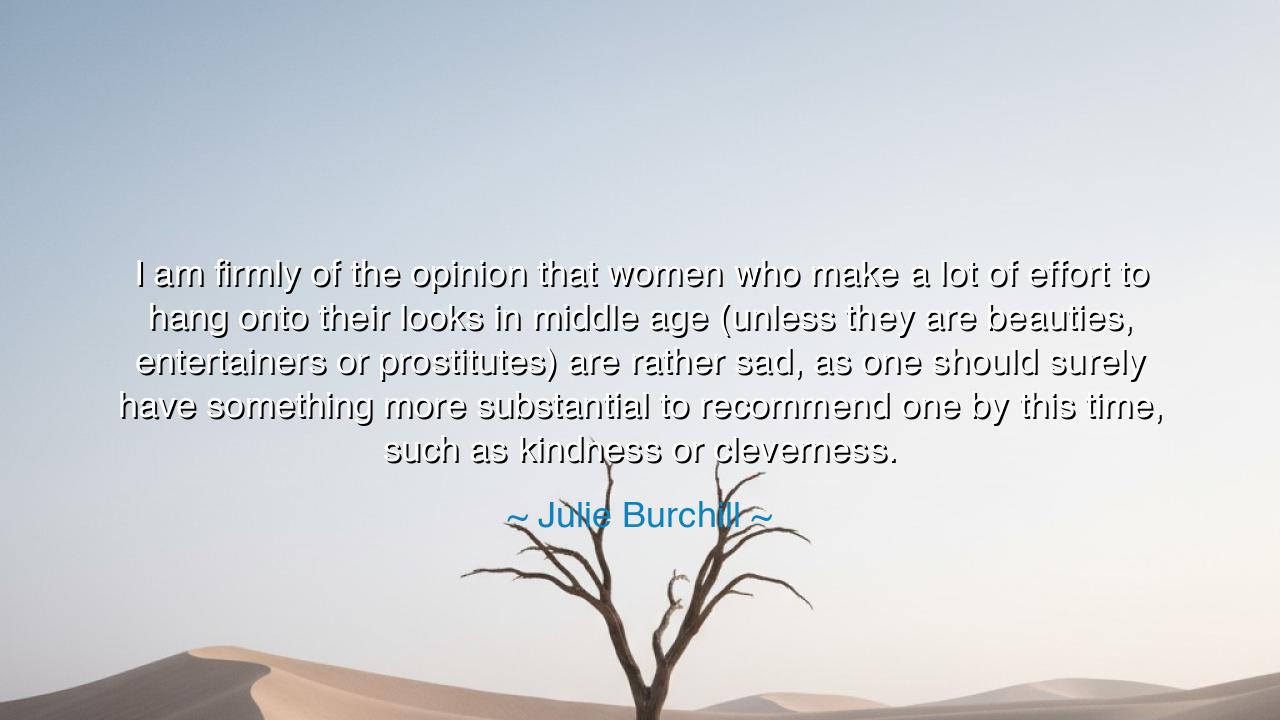
I am firmly of the opinion that women who make a lot of effort to
I am firmly of the opinion that women who make a lot of effort to hang onto their looks in middle age (unless they are beauties, entertainers or prostitutes) are rather sad, as one should surely have something more substantial to recommend one by this time, such as kindness or cleverness.






Julie Burchill once declared, with her usual sharpness and unflinching wit: “I am firmly of the opinion that women who make a lot of effort to hang onto their looks in middle age (unless they are beauties, entertainers or prostitutes) are rather sad, as one should surely have something more substantial to recommend one by this time, such as kindness or cleverness.” In this fierce yet deeply reflective statement lies not cruelty, but truth spoken through fire. Burchill’s words pierce the surface of vanity to reveal an ancient wisdom—that beauty, though divine in youth, must one day give way to character, intellect, and grace. For the face fades, but the soul endures; the mirror betrays, but the mind and heart remain faithful companions.
In the time of the ancients, this truth was known though often forgotten. The philosopher Socrates was said to have been homely, yet he shone with a magnetism that outlasted any beauty. His charm was not in his form, but in the brilliance of his thought and the warmth of his humanity. Burchill’s call for substance over appearance echoes this same eternal law: that after the fires of youth cool, it is not the skin that holds power, but the soul that has learned to love, to reason, to give. To rely still on the adornments of youth is to wage war against time itself—a battle no mortal has ever won.
Yet Burchill does not condemn beauty, nor the care of it. She speaks of effort, of obsession—the desperate attempt to cling to fading symbols instead of cultivating new forms of worth. Her tone, biting though it may be, conceals a lament for a society that teaches women to equate value with youth, and admiration with desire. She challenges not the painted face, but the empty heart behind it—the one who, fearing invisibility, forgets that there are ways to shine brighter than the bloom of skin. To her, the truly radiant woman is not she who looks untouched by time, but she who has turned time into wisdom.
History offers many who embody this transformation. Consider Eleanor Roosevelt, who was mocked for her looks in her youth yet rose to become a voice of courage and conscience across the world. Her beauty was not of the eyes, but of the spirit—the light that glows from within when a person has dedicated their life to something greater than self-adornment. Her kindness and cleverness, the very virtues Burchill esteems, outlived every critic and every wrinkle. Her name is spoken with reverence not because she was lovely, but because she was luminous.
There is something tragic, then, in those who cannot bear to grow old. To fear age is to fear life itself, for aging is not a curse but a coronation—a marking of years lived, lessons learned, love given and received. To hang onto one’s looks is not wrong in moderation; it is natural to wish to remain graceful. But when one makes this effort the center of existence, it becomes a prison. It means one has not discovered the deeper joys of maturity: the calm of understanding, the dignity of acceptance, the beauty of compassion. Youth is the blossom, but age is the fruit—and who would prefer the flower once they have tasted the sweetness of the harvest?
Burchill’s words also serve as a mirror to men and women alike. For vanity is not confined by gender, and insecurity knows no boundaries. In every age, the wise have warned against the worship of appearance. The Stoics taught that the only beauty worth pursuing is that of virtue, and the only youth worth keeping is that of the spirit. To live in obsession with surface is to neglect the soul’s ripening. The ancients would remind us that when the body weakens, the heart must grow strong; when the eyes dim, the mind must learn to see in new ways.
Thus, let the teaching be this: do not fight the tides of time, but learn to sail them. When the mirror shows new lines, let it also reflect new depths. When the applause of youth fades, seek instead the quiet respect of those who value substance. Cultivate kindness that softens the world, and cleverness that brightens it. For one day, when the last traces of beauty have been carried away by time, it will not be your face that is remembered—it will be your presence, your wisdom, your laughter, your love. And that, above all, is the kind of beauty that never dies.
So, O listener of the future, remember: youth is a gift, but character is an achievement. Care for your appearance, but never worship it. Let your beauty serve as an introduction, not as your story. For when the years pass and the world changes, those who built their worth upon the flesh will fade with it—but those who built it upon the spirit will shine beyond the grave, immortal in memory and meaning.






AAdministratorAdministrator
Welcome, honored guests. Please leave a comment, we will respond soon